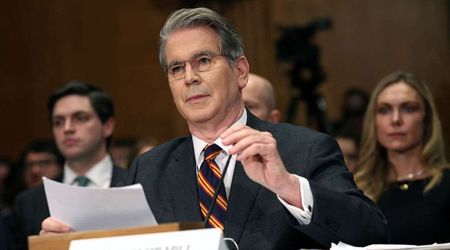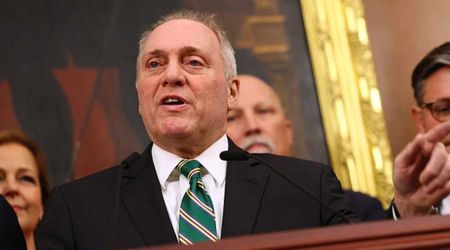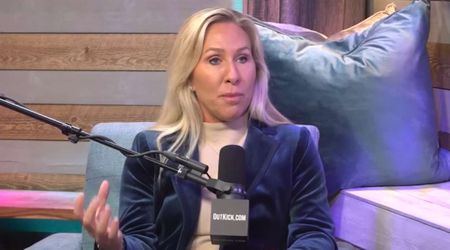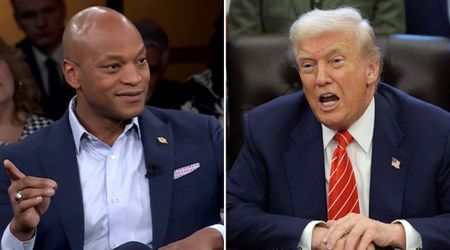Doctor claims Trump’s worsening articulation indicates he has dementia amid ‘deteriorating’ health rumors

WASHINGTON, DC: President Donald Trump's recent public appearances have sparked speculations that the POTUS has dementia.
In March, a clip of Trump went viral where he struggled to pronounce a common word, and on April 2, he wandered away before signing an executive order on 'Liberation Day', raising concerns among people.
Dr John Gartner, acclaimed psychotherapist and author, discussed Trump and his "deteriorating" health in an interview with MindSite News.
Dr John Gartner fuels claims Donald Trump has dementia
During a Zoom call with the outlet, Dr John Gartner claimed that Donald Trump has dementia, asserting further that there is "no doubt" that the president is experiencing symptoms.
He pointed out how Trump’s articulation has worsened over the years to back his claims, per OK Magazine.
Dr Gartner told MindSite News, "When Donald Trump was younger in the 1980s, he was actually quite articulate. He spoke in polished paragraphs; now he has difficulty even finishing a sentence. His thoughts were logical and related: now they’re tangential."

Moreover, he explained how Trump’s word association and use of random phrases are a major component of dementia diagnosis.
"What happens is that someone is trying to say a word and then they get the first part out but they have to end it or create one because they can’t remember the rest. Trump will say something like ‘mishiz’ for missiles, or ‘Chrishus’ for Christmas because he can’t complete the word," the doctor stated.

Dr Gartner further claimed that Trump's physical well-being is also beginning to decline.
He continued, "He (Trump) used to be quite graceful, and now he uses a wide-based gait typical of frontotemporal dementia, sometimes he swings his right leg in a semi-circle. He also has trouble getting up the ramp; he has trouble doing physical things."
Dr Gartner was asked during the call if the president was fit to serve the people of the country. The doctor had his doubts, and even compared Trump to Adolf Hitler.
He said, "I’ve often said that Trump is the American Hitler, and immigrants are the new Jews."

Notably, Dr Gartner based his findings on what he claimed to be the "deterioration" of Trump’s "baseline of functioning", which is important for any dementia diagnosis, per the outlet.
Moreover, he further accused the establishment of "sanewashing" Trump, and said that he has "really populated the whole government with people who are more or less equally sick", according to Radar Online.
Donald Trump's recent public appearances spark health concerns
Since Donald Trump took the Oval Office in January 2025, many of his public appearances have raised concerns among people.
In March 2025, Trump sparked health concerns as a clip of him struggling to read was posted to X, according to Irish Star.
Mr. "I don't need a teleprompter" Donald Trump calls Ireland's patron saint, Saint Patrick, a "patriot saint" as he struggles with his script.
— Art Candee 🍿🥤 (@ArtCandee) March 12, 2025
Bro can't read. pic.twitter.com/EmUsvXbTlV
The clip showed Trump incorrectly pronouncing the word "patron saint" as "patriot saint" and repeating it again, causing some to say he has dementia, per the outlet.
Similarly, on April 2, the POTUS simply wandered away before signing executive orders during a Rose Garden ceremony on 'Liberation Day', where he declared a national economic emergency and announced tariffs starting at 10 per cent on all countries trading with the United States.
Trump leaves the stage but is guided back to sign the executive orders pic.twitter.com/vhpxNNLBMa
— Acyn (@Acyn) April 2, 2025
This incident made people compare him with Joe Biden, who had also sparked health concerns during his run as POTUS.
Questions regarding Trump's mental health were raised way before he won the 2024 election.
In October 2024, PBS News reported that Trump's remarks were rambling or incoherent and also mentioned an event in which he swayed silently to music on stage for close to 40 minutes, raising questions about possible cognitive decline.










